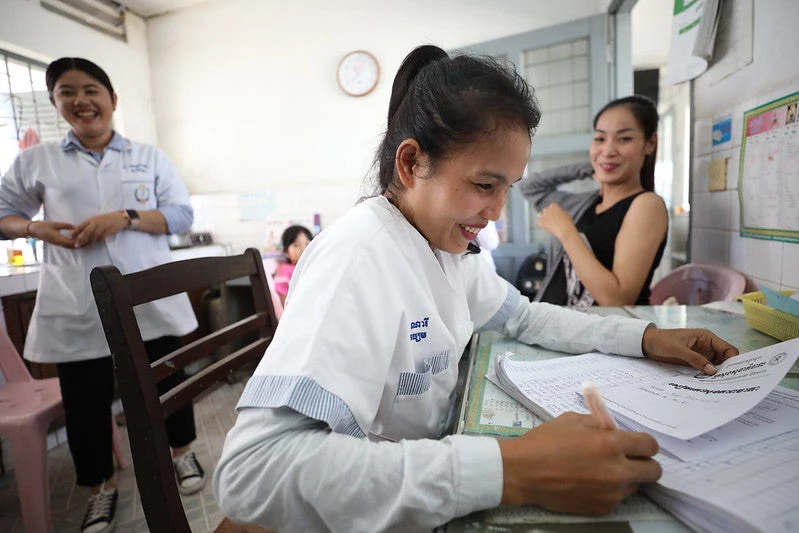 Rath Thida, mère enceinte, reçoit des soins prénataux au centre de santé Teuk Thla à Phnom Penh, au Cambodge.
Rath Thida, mère enceinte, reçoit des soins prénataux au centre de santé Teuk Thla à Phnom Penh, au Cambodge.
Last September world leaders made a historic political declaration at the United Nations General Assembly where they pledged to attain Universal Health Coverage for all citizens by 2030. To achieve this much-needed goal, countries are working to increase access to public and private health care, especially in remote and underserved regions, and to ensure that the care provided is affordable and good quality. But in the push to get this done, it is important for us to remember the role that ethical decision-making plays in ensuring that health care systems are strong and provide quality care to everyone.
Private health providers under pressure
The COVID-19 pandemic has put the world’s health care infrastructure under massive pressure. Health care providers face unique challenges. Some have been stretched to capacity and beyond due to surges in admissions of COVID-19 patients. In addition, many clinics and hospitals have been hit with a huge cash crunch, as patients put on hold elective surgeries, triggering a steep drop in revenues. For private providers in particular, sharp economic downturn threatens revenues, hurting their ability to maintain operations and serve their patients.
Operating in such adverse conditions, providers can find themselves tempted to cut corners—for instance, in the quality of care patients receive or in how they treat their health care workers on the frontlines battling the pandemic. Managers and practitioners are constantly making critical decisions at short notice. In such circumstances, having a detailed set of principles to help them meet high ethical standards as they make these decisions would be enormously useful.
Ethical Principles in Health Care
We could not think of a better time to launch the World Bank Group’s Ethical Principles in Health Care—or EPiHC. These are 10 principles that we urge private health care providers and investors worldwide to publicly adopt, support, and reference in their work. They offer guidance in a range of areas, such as upholding patients’ rights, safeguarding information and using data responsibly, and protecting and empowering staff. The EPiHC were developed by the International Finance Corporation (IFC) in collaboration with the World Bank after consulting with providers, investors, payors, and industry experts.
Across emerging markets, the private sector is an important provider of health care—in some countries it is the main provider. From a small community clinic to a mom-and-pop retail pharmacy to a nationwide hospital chain to a local manufacturer producing a certain kind of hospital equipment, the private sector is omnipresent. Unfortunately, certain aspects of the industry can incentivize unethical practices. As businesses try to juggle complex and often competing considerations, EPiHC can help ground their decisions in an ethical framework.
Over the past year, 20 health care companies, including many IFC investee clients from IFC’s $2 billion health care portfolio, signed up to become EPiHC Founding Signatories. Now we are casting the net wider to persuade private health care operators across the globe to join the growing network of EPiHC signatories. Follow-up activities are planned like webinars to help signatories gain a more granular understanding of how to integrate the EPiHC into daily operations.
Furthering ethical health standards
We believe that ethical standards and quality care are two sides of the same coin. That is why IQ-Healthcare, an advisory service IFC launched in 2018, will be a complementary tool in rolling out EPiHC. Under IQ-Healthcare, IFC’s team of health care quality specialists work with clinics and hospitals in emerging markets on the ground to improve the quality of care. The tool has already been deployed to more than 30 health care companies in 15 countries and demand is robust and growing.
As the battle against COVID-19 continues, we believe that the EPiHC can serve as industry guardrails for the private health care community. Ultimately, ethically minded decision-making spurs higher quality care for patients, better protects health workers, and lays the foundations for a successful and sustainable business.



Join the Conversation